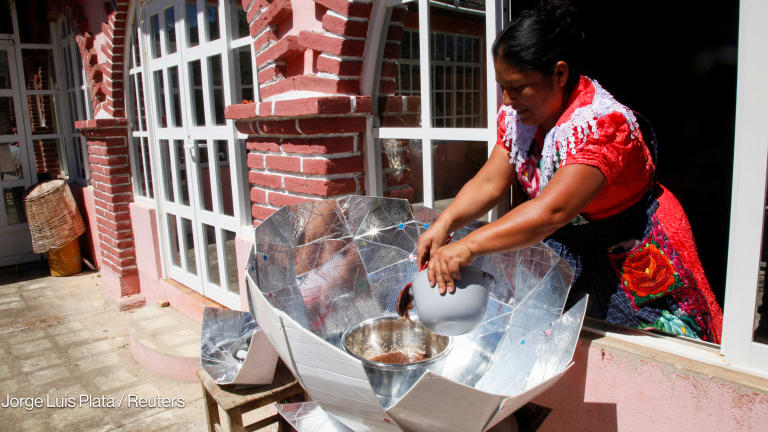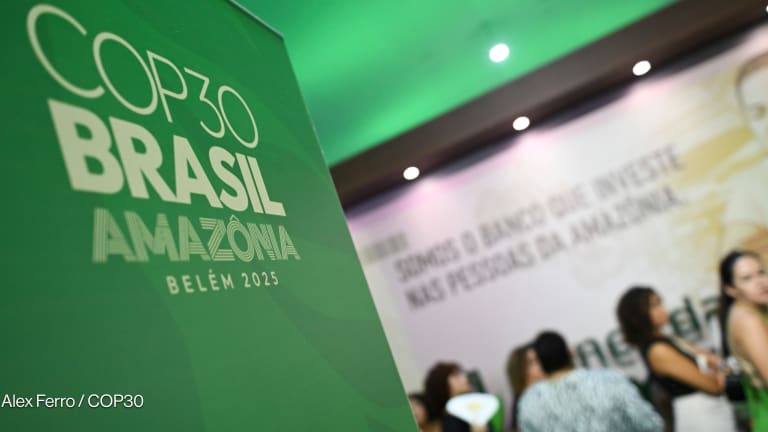
In many ways, Marcelo Mena sees his new position as the head of the Global Methane Hub as a continuation of the climate activism that marked his tenure as Chile’s environment minister.
The organization, which launched last year, is a coalition of more than 20 foundations and other philanthropic organizations seeking to reduce methane emissions worldwide — specifically, to build on the Global Methane Pledge to achieve a 30% reduction in these emissions by 2030 and to limit warming by 0.2 degrees Celsius by 2050.
A biochemical engineer by training, Mena previously served as minister and vice minister of the environment from 2014-2018 under former Chilean President Michelle Bachelet, who is currently the United Nations high commissioner for human rights. Under her presidency, Mena took on several environmental initiatives, such as helping to enact clean air car rules and protecting 720,000 square kilometers (280,000 square miles) of ocean water.
“I’ve always been an activist,” Mena told Devex. “But I’ve always worked in diplomatic spaces where saying things directly has a lot of weight because you’re speaking as part of a government or part of an institution that has a consensus. Sometimes this allowed me to push the envelope about the necessity of getting fossil fuels out of homes and to phase out fossil fuels altogether, because incremental change isn’t going to cut it.”
Last month, Mena stepped in as the first CEO of the Global Methane Hub, where he said he wants to initially focus on short-term solutions for mitigating methane emissions before eventually ramping up to support large-scale “transformational” changes to “big emitter” sectors such as energy, agriculture, and waste. Funding and support will go to country governments that signed the pledge.
The hub launched in the fall with nearly $330 million in philanthropic commitments to “drastically reduce methane emissions around the world.” Among its members are Bloomberg Philanthropies, billionaire Bill Gates’ Breakthrough Energy venture firm, the Children’s Investment Fund Foundation, the William and Flora Hewlett Foundation, High Tide Foundation, the IKEA Foundation, the John D. and Catherine T. MacArthur Foundation, and the Skoll Foundation.
The hub, which is now hiring staff members across multiple countries, will be based in Mena’s home country of Chile. From there, Mena will oversee the distribution of the $220 million in pooled funding from separate methane mitigation commitments made by participating foundations, as well as an additional $100 million that they jointly provided when launching the initiative last year, according to spokesperson Sakura Amend.
Mena said that his job will be to “align the funding with a strategy, with purpose.” The Global Methane Hub’s primary goal is to accelerate the reduction of global methane emissions, he said.
More than 100 countries signed on to the Global Methane Pledge, launched at November’s U.N. Climate Change Conference in Scotland. They agreed to collectively reach a 30% reduction in global methane emissions from 2020 levels by 2030. The hub will support those countries by investing in methane reduction initiatives. Methane does not have the same long-lasting effects of carbon dioxide in terms of global warming but is believed to have more than 80 times the warming power.
“I spent a lot of time thinking about how we could change that dynamic between the environment and growth and development.”
— Marcelo Mena, CEO, Global Methane HubMena announced on Friday that the hub would contribute $10 million to the U.N. Climate and Clean Air Coalition, which includes Bangladesh, Canada, Ghana, Mexico, Sweden, the United States, and dozens of other countries. According to the hub, the $10 million will be allocated over three years “to assist 30 countries with developing plans to reduce their methane emissions, including technical support to estimate emissions.” It also will help them identify mitigation options and design policies to meet those goals.
The hub already is developing “sector-based strategies for waste, agriculture, and fossil fuels,” the organization said. It is also developing a monitoring, evaluation, and learning framework — which helps to evaluate the activities and impact of programs — for strategy and grant-making, according to a press release.
“Methane emissions reduction is one of the fastest ways to abate global temperature rise, which in turn helps countries avoid the devastating effects of climate change,” said Richard Lawrence, a co-founder and director of High Tide Foundation, in a statement announcing Mena’s appointment.
“Under Marcelo’s leadership, The Global Methane Hub will help governments, civil society, and the private sector inspire greater climate ambition on methane reduction. We are thrilled that such a highly respected and long-time climate action advocate is leading The Global Methane Hub,” he added.
In addition to his work in the Chilean government, Mena was a practice manager at the World Bank, and he led a team that created the Coalition of Finance Ministers for Climate Action, which includes around 70 countries, and contributed to the Action Plan on Climate Change Adaptation and Resilience.
“I spent a lot of time thinking about how we could change that dynamic between the environment and growth and development,” Mena said.
In his new role, Mena said he wants to work with countries across the global south and global north as they develop strategies for reducing methane emissions. The organization’s “aspiration is to just mitigate emissions wherever they are,” he said.
Most methane pledges currently target the energy sector, but countries must also “lay the groundwork for the long-term transformational change” in food and waste systems, Mena said. He also listed public health, local air pollution, environmental justice, and biodiversity as areas of interest.
Targets and entry points for the hub’s work are likely to vary based on the region, Mena said. For example, agricultural emissions will likely be higher in Latin America while energy emissions will be higher in the Middle East, he said. The hub wants to establish a regional approach that includes regional directors to work with local nonprofits and partners, he said. It also is setting up offices in Washington and Copenhagen, Denmark, Mena added.








